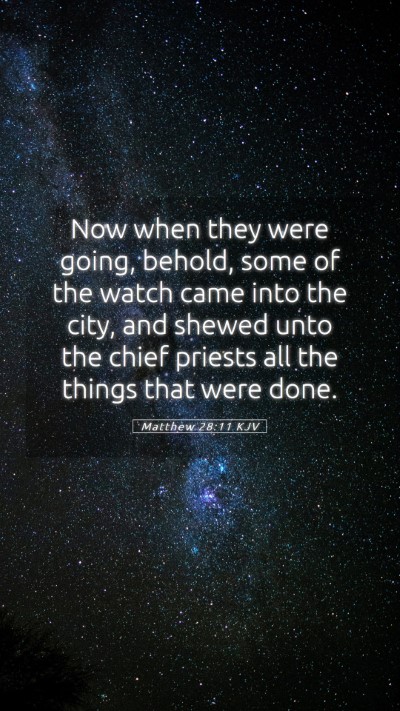Understanding Matthew 28:11
“Now when they were going, behold, some of the watch came into the city, and shewed unto the chief priests all the things that were done.” - Matthew 28:11
Bible Verse Meaning
This verse occurs immediately after the resurrection of Jesus Christ when the guards at the tomb witnessed the miraculous event. It serves as a critical point in the Gospel of Matthew, highlighting both the fear and the disbelief surrounding His resurrection.
Bible Verse Interpretations
The guards' report to the chief priests represents a pivotal moment in the narrative where evidence of the resurrection is presented. Their actions illustrate the gravity and significance of what they witnessed.
Bible Verse Understanding
Understanding this verse involves recognizing the socio-political context of the time. The chief priests, representing the religious authority, were deeply concerned about maintaining control over the narrative of Jesus' resurrection and preventing further unrest among the populace.
Bible Verse Explanations
According to Matthew Henry's Commentary, this event reveals the significance of the resurrection, as even guards, who were tasked with preventing such occurrences, were compelled to report the truth. Albert Barnes notes the contrast between the guards' faithfulness in reporting the event and the religious leaders' subsequent actions to suppress it.
Scripture Analysis
Adam Clarke highlights that the response of the chief priests showcases a willful ignorance. They had clear evidence of Jesus' resurrection yet chose to fabricate a narrative (as detailed in subsequent verses). This speaks to the broader theme of resistance against divine truths.
Key Themes and Insights
- Contrasts in Belief: The guards believed and reported the truth, while the religious leaders conspired to hide it.
- The Birth of Deception: There is a stark implication of human tendency to resort to deceit when faced with uncomfortable truths.
- Evidence of the Resurrection: The guards' testimony adds weight to the factual belief in the resurrection, a cornerstone of Christian faith.
- Fear of Authority: The reaction of the chief priests exemplifies the fear of losing control over their followers and influence.
Relation to Other Scriptures
This verse connects to several other passages that enhance its meaning and provide further context:
- Matthew 27:62-66: Details the precautions taken by the chief priests and Pharisees regarding the tomb.
- Matthew 28:12-15: Describes the leadership's attempt to discredit the resurrection.
- Luke 24:8-11: Provides an account of the women at the tomb and the response of the apostles to the resurrection announcement.
Application of This Verse
In contemplating this verse, believers can identify areas in their lives where they might resist the truth or fabricate narratives that suit their comfort. It challenges readers to cultivate a heart open to the truths of scripture and the actions of God, regardless of societal pressures or personal beliefs.
Final Thoughts
The story unfolding in Matthew 28:11 serves as a reminder of the resurrection's monumental significance in Christianity. It urges followers to seek genuine understanding and to share the truth with courage, inspired by the witnesses themselves.


